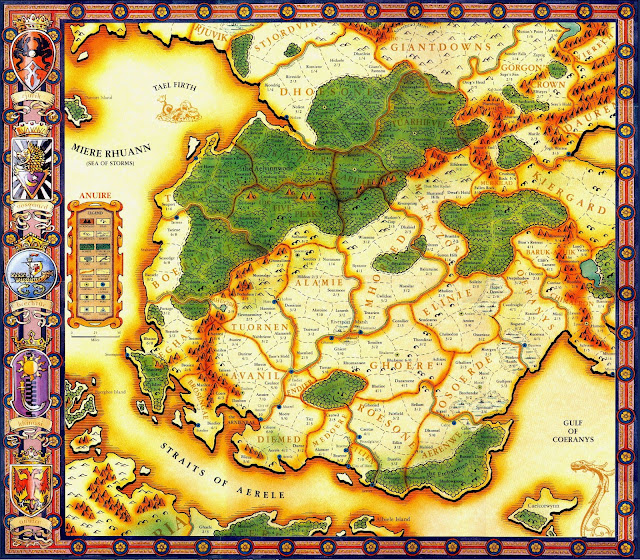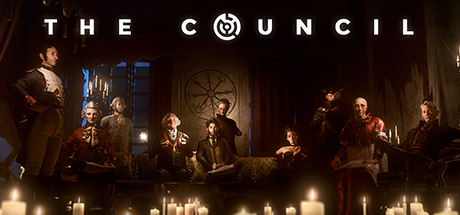Since then, I played in this crazy Birthright game in which every PC was the ruler of a different country and could barely talk to each other outside of short, public messages until a grand council every five years let us actually speak in private for five Haelyn-damn minutes. At this "Sword and Crown" event, there were players in every room of the real-life house trying to make the most of this rare opportunity to make some sausage with the other rulers. My current play-by-post game Ten Blade Demigod is not quite as restrictive, but every council of rulers has set the game flying in a different direction.
 |
| Map of Anuire. I ruled Endier, that little country next to the forest above the central southern coast. |
On a more sane scale, I recently got the chance to run two Vampire: the Masquerade scenarios that start with a dinner party. I assume the prevalence of vampire parties in that game owe much to the LARP influence in that scene. The first, "Baptism by Fire," is meant to be an introduction to the setting through a very underwhelming social engagement. The second, "Annabelle's Party," sets up an investigation that spirals out into the politics of vampiric Chicago.
Notwithstanding some good advice on how to run parties, I wonder if the potential of councils is not overlooked. It makes sense that in the OSR scene is primarily made up of dungeoncrawling, hexcrawling, and marginal domain play, but the concept of a primarily social game is often brought up in the absence of a procedure or game loop, and I think a "councilcrawl" provides one such framework.
A councilcrawl will need to be structured to be useful with a normal number of players and a single DM. Huge twenty-person affairs have amazing energy, but will rarely be feasible as, say, a weekly game.
How much of a councilcrawl campaign will be made up of these parties? Some people run dungeoncrawl campaigns that are all dungeon-delving, but most also include time spent in the wilderness or negotiating with people in town or briefly hexcrawling. Hexcrawl-central campaigns usually have some dungeon-delving elements. A councilcrawl campaign could feature councils as the main events, like the dungeons of a dungeoncrawl or the hexes of a hexcrawl. It could also feature councils as the connective tissue, like the dungeon of a hexcrawl or the hexes of a dungeoncrawl.
A central councilcrawl: imagine a campaign in which the party prepares carefully for a regular meeting of the Conanesque city's leadership. It is at these meetings that the fortunes of the party is made or lost, where attendees are sometimes found slain by unknown hands, where the peril and adventure is. Between the councils, there is a quick set of mechanics to see how the political decisions of the previous council plays out and to give the principle actors time to kidnap each others' niblings and make other preparations.
A connective councilcrawl: imagine a campaign in which the party needed to attend a freewheeling negotiation with a handful of interested parties in order to prepare for their dungeoneering expedition, securing funding and deciding who best to serve. Each council would have many influences on the delve itself, but it would also have its own self-contained arc in which enemies are made and thwarted, secrets are revealed, and plots are advanced. The council serves the dungeon loop, and is not where most of the experience is gained.
There are other ways to do this. It's important to remember how rare it is for a long-form campaign to fit entirely into one play procedure, and there is no set point for how the procedures should interact with each other.
 |
| The Council, an enjoyable mystery game about a meeting of important personages on a lone island |
The councilcrawl, like other game procedures, places certain limitations on the game. It must be somehow taken for granted that principle agents (PCs and important NPCs) will be meeting under a flag of nominal peace with serious goals. The threat of violence needs to be a big deal in these conditions, and if someone is murdered that could be enough to take their proven killer out of play.
Because we're designing these councils for play around a table, they cannot be designed exactly like a twenty-person LARP. The PCs should be able to stay together most of the time, all of them participating in discussions. Conversations they're a part of should involve them, not sideline them, and will ideally include a small number of important NPCs at a time to keep the conversation manageable.
This can go too far! The VtM module "Baptism By Fire" states that it is a module about a New Year's Eve party, but as far as I can tell there is almost no interaction between the NPCs at all. One vampire will sit in front of an empty fireplace all night and speak as little as possible, up to and including using his magic vampire powers to make PCs go away. Another is so shy as to make interaction nearly impossible unless the DM bends the rules a bit. A third one doesn't talk. As written, none of these people can even be found in the same room. There's about six vampires at this party, zero human guests, and a staff that has been magically rendered unable to hold a conversation.
If it's a party, it should feel like a party is what I'm saying. NPCs should be talking to each other, there should be music and food, and occasionally two people can get serious looks and say "let's discuss this somewhere private" so a PC can eavesdrop by holding a glass to the door.
Because so many examples of the genre are serious and political and Machiavellian cavalcades there has sometimes been a desire to make the NPCs so convoluted and tight-lipped that only cunning and perceptive players will ever figure out what they are about. This is the opposite of ideal. If any kind of game should be playable with a glass of wine in your hand and two in your belly, it should be the dinner party game. NPCs can and should have hidden motives and emotional depths, but they should be signposted like a Bastionland trap or simple enough that a DM finds it easy to run ten such characters. Something like "rogue vampire, seems to know almost nothing about vampire society, is actually a vampire hunter in disguise" is complicated enough. The political action of the game should be free-wheeling, with revelations leading to dramatic confrontations and hasty blackmail and exile. There should always be time pressure.
Similarly, council designers should resist the temptation to base all NPC's motivations on cold realpolitik. The emotional throes of lovers, family members, and betrayed students are important for keeping things moving and establishing solid stakes.
Every council needs its central problem. In the murder mystery dinner party, this is a murder. If everyone is solely concerned with their own personal issues, the event never really comes together. Therefore, the central problem should relate to most characters directly and the rest indirectly, and it should matter how the central problem is resolved.
A central problem can be subtle. This is actually the great achievement of "Baptism by Fire." Despite failing to really feel like a party as-written, the central problem is the presumption that the PCs and their players are new to the concept of vampires society. Every NPC exists to introduce the PCs and players to an important facet of the game, and many of those NPCs get quickly interested in how the PCs adapt to vampire society.
 |
| from Vampire: the Masquerade Bloodlines 2 |
Therefore, an outline for preparing councils and a procedure for running them:
To prepare the council, the DM needs to consider the council's premise, its central problem, its major NPCs, and its itinerary. It is hard to define the exact order in which this should occur, because over the course of a campaign some of these may be established first. Maybe the PCs are throwing this council and choosing who to invite and why. Maybe most of the major NPCs are recurring characters and therefore already established. Starting from scratch, I think it should be most typical to start by defining the premise and central problem, then filling in NPCs and itinerary, backtracking and refining as you go.
The premise is the in-universe intention for the council. Typically some kind of social function or a meeting that must come to an important decision.
The central problem is the DM's reason for the council. This might be the same or it might be different as the premise. If the premise is of a friendly social function, there's got to be a murder or some other kind of crisis. If there's already an issue, perhaps it becomes more pressing and intense. A council of the goodly folk of Middle Earth to decide what to do with a Ring of Power is already portentous, but suspicions that the ring is actively corrupting those at the council would make for a great game session. The central problem could hypothetically be transplanted to a different premise (say, the PCs having a drink at their friend Bilbo's birthday party) but the central problem should be specifically crafted to heighten the drama of the premise.
The major NPCs are the important people who will help to create and act out the drama of the council. If the council is made up of a lot of people, don't make them all important. Come up with a representative NPC to stand in for the interests of a larger group. If the council is made up of a small number of important personages, you can and should bulk out the roster with those personages' friends, family, and servants. There should be at least four major NPCs, but not so many that it's hard to run them. Giving them distinct personalities and quirks will help to keep them straight. Each NPC needs a goal and a reason they can't achieve it, so as to facilitate scheming and getting an X-factor like a PC involved.
The Itinerary is a DM's tool, not the in-universe plan for the council. To keep things running and apply time pressure, set events should happen throughout the council that will change the way characters act. Four or five events is plenty for a council that lasts a session. These can be major events that bring everyone together, like the discovery of a murder, or smaller scenes that bring characters aside, like a major NPC's attempt to seduce one of the PCs. If conversations start to drag, the DM can say "some time passes, and then" and introduce the next point on their itinerary. The itinerary cannot be set in stone. Sometimes, someone who was supposed to accuse a PC of seduction in act three is dead in act one. Stay nimble.
From these elements, the procedure of play starts to form. Unlike certain RPG procedures, those of a council should be freewheeling, fast, and light. The loop is something like:
DM describes the state of the council ☞ players gather information through conversation and investigation ☞ players or itinerary change the state of the council ☞ repeat step one.
Most of these changes will not require much rolling of dice. Perhaps information gathering will requires some skill rolls to discover or understand the clues, or perhaps the state of the party is changed by, say, a combat that requires a contest of dice, but the conversations themselves should need little mechanization.
This is all someone used to running games and playing characters should need. Players can detect when a social event is used to deliver exposition and tepid political dialogue, but they can also smell out an opportunity to strike it rich in a single night. Make the council rewarding and dangerous, and it can be electric.
Example
Okay, I'm going to time myself. It's 10:05 and I'm making spaghetti while I write this.
Premise: the PCs have just successfully raided the Tomb of the Serpent Kings, and they've been offered a lucrative contract to raid the nearby Tomb of the Mud Sorcerer.
Central Problem: keeping it simple. The local ruler despises tramps and troublemakers like the PCs and will try to foil anything good for them,
Major NPCs:
- The Host, who hired the PCs initially. He wants to downplay the danger of the Mud Sorcerer's Tomb, but also needs their help to get resources from other guests to make it possible and profitable.
- The Host, who hired the PCs initially. He wants to downplay the danger of the Mud Sorcerer's Tomb, but also needs their help to get resources from other guests to make it possible and profitable.
- Lisa Withanelle, potential investor. She wants to purchase any weird artifacts the PCs stole from the Tomb of the Serpent Kings, but is competing with Katherine, whom she's hopelessly in love with.
- Katherine, the second potential investor. She was sent by the king to scupper preparation, but is hopelessly in love with a random PC and wants to buy their dungeon treasures.
- Alocious, the host's son. Wants to convince his father and the PCs not to enter the tomb because it's too dangerous. He has studied the tomb and the weird language found within and would be a valuable member of the expedition.
- Timbo, the host's mysterious servant. Secretly a cultist of the Mud Sorcerer religion who wants the expedition to set out but ultimately fail.
- Hargrave and Strong-Gout, two former adventurers who led a failed expedition to the Tomb. They're both actually the Host's long-lost bastard sons. Hargrave wants to seize their birthright but Strong-Gout wants to reconcile. Neither wants to act without the other's consent.
- King Angram, who eventually shows up and acts all pissy. Wants the PCs run out of town, but can't afford to offend the Host.
Itinerary:
- Guests arrive. The Host introduces everyone, and they share a toast.
- Hargrave and Strong-Gout have an argument before retreating to a backroom to discuss their issues.
- Katherine makes a pass at a PC
- Lisa asks that same PC for advice courting Katherine
- Dinner is served: honied crab legs, garlic bread, spiced yams, and onion soup. Alocious makes a scene about how dangerous the expedition will be.
- Timbo waits until a PC is alone with Alocious, then slays him while under an invisibility spell to frame the PC.
- King Angram arrives unannounced, looking for a reason to run the PCs out of town and annoyed he wasn't invited to the party. The Host begs the party not to reveal any murders that may have occurred.
- Eventually, the party concludes.
It is now 10:29. My spouse is happily enjoying some spaghetti, and I've got a usable draft for a session. With a few more minutes, I could clean it up, maybe assign some fun mannerisms or add potential events to the itinerary. One thing I would be on the lookout for is more opportunity to establish potential risks and rewards. I would give the potential investors magic items to potentially trade for any the party have. These items could also serve as clues or red herrings for any murder investigation. Defining the influence of the investors of the king with an eye towards winning their friendship or enmity would be helpful. Statting out Timbo, Hargrave, and Strong-gout could pay. I would define more facts about the home in which the party is meant to take place, and come up with some reasonable clues about Timbo's identity.
ay yo there's a vampire the masquerade bloodline 2? big fan of the first one
ReplyDeletewhat kind of spaghetti did you make
like the post too, good brain
Thank you for the spaghetti, my beloved little gummy bear! It was delicious.
ReplyDeleteVery interesting. I'd love to see an actual play, or perhaps excerpts from one, putting this into practice.
ReplyDeleteI'm a little uncertain about The Host asking the PCs to cover up "any murders" if one of the murders is that of his son, Alocious.
ReplyDeleteYeah, that’s an instance where the spaghetti brain came up with something shaky.
DeleteI NEED more details about that Birthright game, that sounds awesome.
ReplyDeletegreat post!
I think the most important part about the guests is to have them be conflicted in their goals, exactly like you've done here.
ReplyDeleteI've been considering doing a "conversation-crawl", where the PCs are at a noble event, having to flit between different movers and shakers to try and get something to work for them. The Major NPCs are set up in different parts of the estate, the equivalent of Hexes. Having a Major NPC talk to another Major NPC directly is a *major* occurrence, it is more likely they will send the PCs as a go-between because they are comfortable sitting there.
I think the issue you might run into with a councilcrawl is a situation where the PCs are sitting quietly listening to you try and hold a four-way conversation with yourself. Still, more power to you if you can handle it!